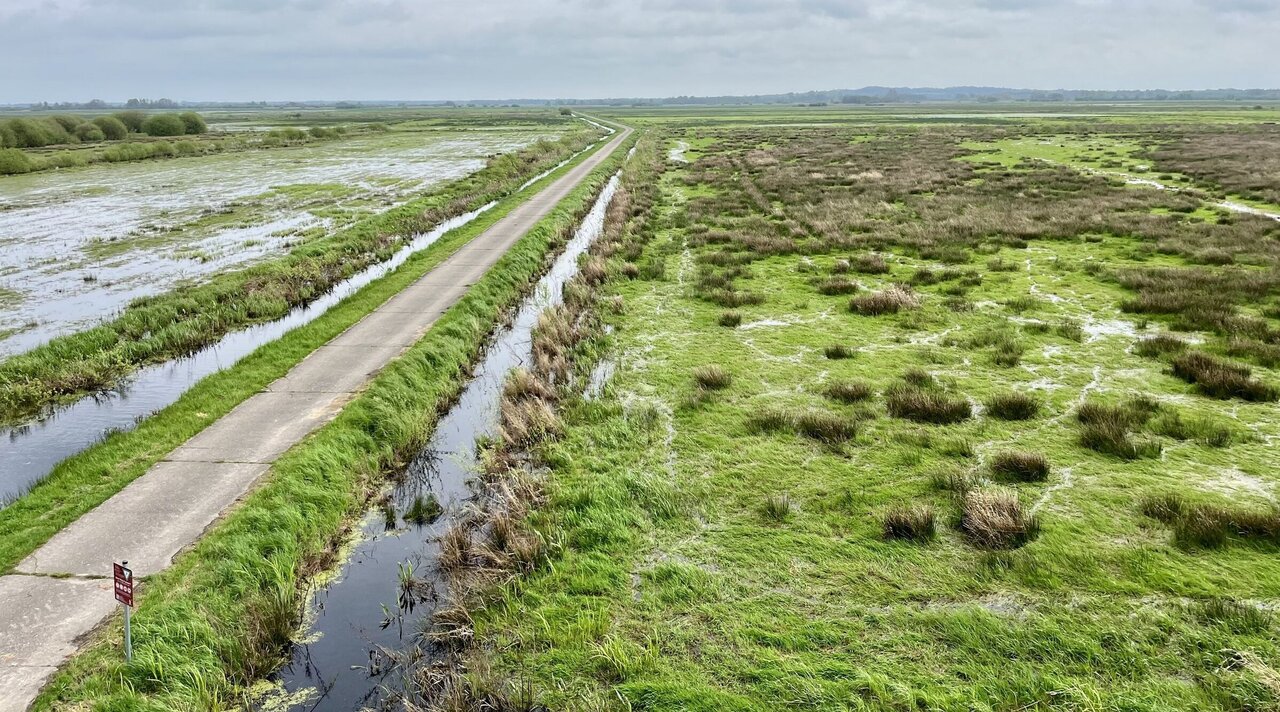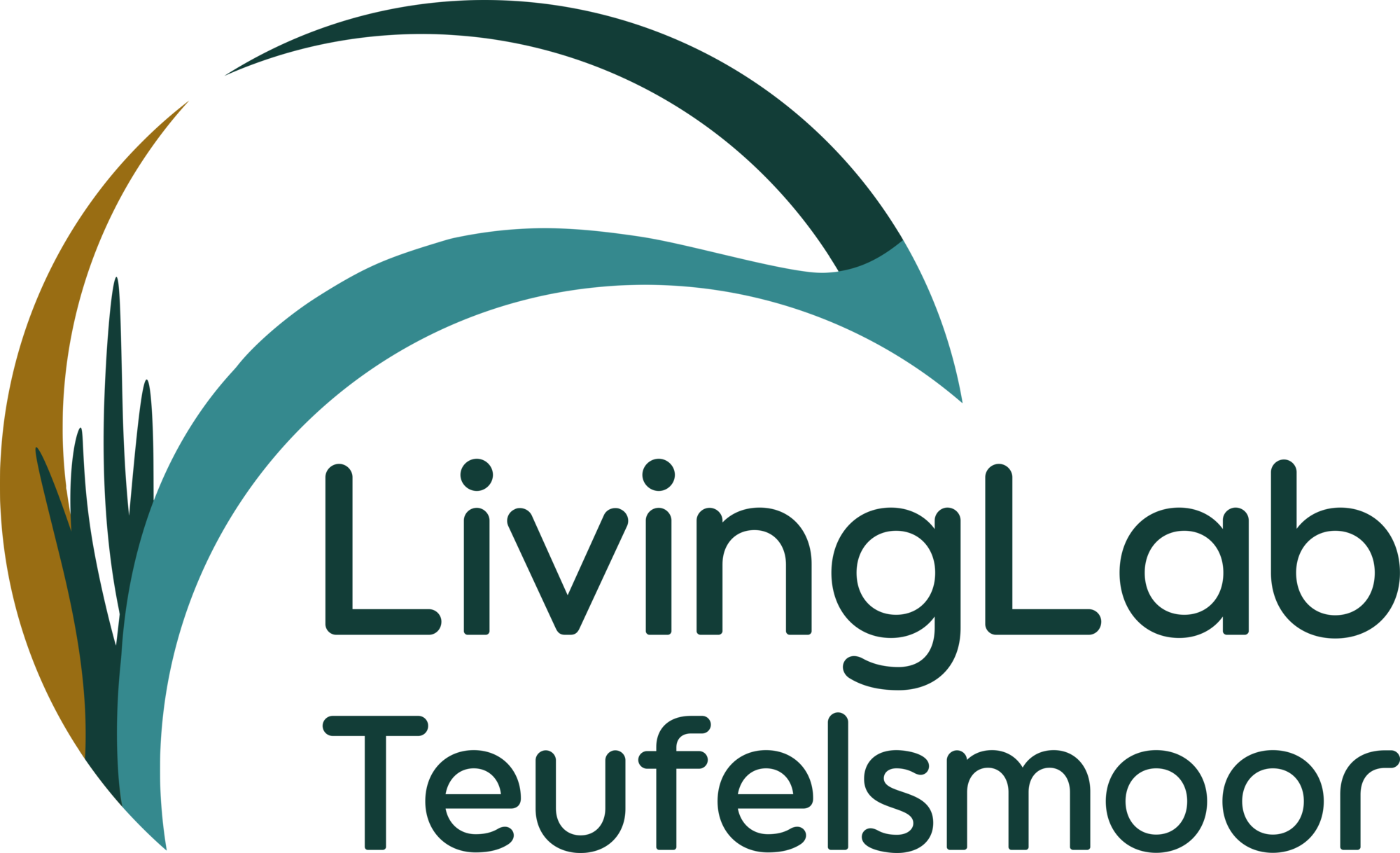Project
LivingLab Teufelsmoor

LivingLab Teufelsmoor – Climate and nature protection-oriented grassland management on wet peat soils with innovative biomass utilization in the administrative district Osterholz, Subproject 2: Greenhouse gas exchange, hydrology, soil properties and nutrient retention
What are the effects of wet grassland paludicultures on greenhouse gas exchange, hydrology and nutrient cycling?
Background and Objective
The majority of the peatlands in Germany is drained for agriculture and forestry and thus responsible for a large share of the greenhouse gas (GHG) emissions from agriculturally used land. One option to reduce emissions is paludiculture, i.e. agriculture or forestry on rewetted peatlands. Ideally, re-wetting of currently drained peatlands with subsequent paludicultural use conserves the peat, but value chains are so far underdeveloped.
The district Osterholz (Lower-Saxony) is characterised by one of the highest shares of peat soils in Germany, including the “Teufelsmoor”. Some areas were restored aiming at the protection of meadow birds. However, utilization options for the biomass have been lacking so far. Further, large peatland areas are still used for drainage-based agriculture.
The “LivingLab Teufelsmoor” is coordinated by the Chamber of Agriculture Niedersachsen. The main objectives of the project are to establish an adapted land use of rewetted peatlands on a practically relevant scale (up to 200 ha) and to develop an innovative and economically viable utilization of the biomass from wet grasslands. Within the transdisciplinary and iterative process of the Living Lab further suitable areas for paludiculture crops will be identified and established. Furthermore, with the participation of stakeholders from economic, scientific, ecological and social domains, opportunities of biomass production, processing and marketing should be tested and regional processing and marketing of the biomass should be established. The project will be supervised and evaluated scientifically through agro-economic, ecological and socioeconomic studies and measurements of greenhouse gas emissions and water quality.
The LivingLab Teufelsmoor is one of nine large projects of the PaludiNet, which are funded either by the German Federal Ministry of Food and Agriculture (BMEL) or the German Federal Ministry for the Environment, Nature Conservation, Nuclear Safety and Consumer Protection (BMUV). The goal of the projects is to grow paludicultures at a regular agricultural scale and to establish utilization chains.
Different paludiculture options are implemented: Sphagnum farming as an alternative to peat as growing media as well as wet grasslands, cattail and reed for building and insulation materials, paper and packages, and other uses. The implementation of all projects goes along with a scientific evaluation of the ecological and economic effects of paludiculture. The PaludiZentrale as part of the PaludiNet is responsible for overarching coordination and networking as well as for the harmonization of the methods and synthesis studies.
Approach
In our subproject of the LivingLab Teufelsmoor, we aim at quantifying the greenhouse gas (GHG) balance for two wet grassland paludicultures and a reference site for 9 years. For carbon dioxide and methane, we use the eddy-covariance method. Nitrous oxide and methane fluxes at the drained reference site will be measured manually with chambers.
For one wet grassland and the reference site, nutrient export rates will be compared by measuring the discharge and concentrations of nitrogen, phosphorus and dissolved organic carbon.
Further, a hydrological monitoring network will be set up for both already rewetted areas used for biomass harvest and paludiculture sites implemented within the course of the project. Changes in surface elevation and soil properties will be monitored as well. This data will help us to improve our understanding of both GHG fluxes and biomass quality. Results of the GHG flux measurements will be scaled up to the whole project area and further wet peat soils in the district using data on peat water levels, ground elevation and vegetation.
Furthermore, GIS analyses will be used to derive potential target areas for raising water levels and implementing paludiculture. The analyses will account for hydrological prospects, legal status, nature protection priorities and current agro-economic framework conditions of the whole district. Results will be fed into the Living Lab process to foster discussion.
Thünen-Contact

Involved Thünen-Partners
Involved external Thünen-Partners
- Landwirtschaftskammer Niedersachsen
(Oldenburg, Uelzen, Hannover, Deutschland) - Landkreis Osterholz
(Osterholz-Scharmbeck, Deutschland) - Michael-Succow-Stiftung
(Greifswald, Deutschland) - Technische Universität Dresden
(Dresden, Tharandt, Deutschland) - Niedersächsisches Landvolk - Kreisverband Osterholz e.V.
(Osterholz-Scharmbeck, Deutschland)
Funding Body
-
Fachagentur Nachwachsende Rohstoffe e.V. (FNR)
(national, öffentlich)
Duration
1.2024 - 12.2032
More Information
Project funding number: 2222MT002B
Project status:
ongoing

![[Translate to English:] [Translate to English:]](/media/_processed_/6/4/csm_titel_CO2Kampagne8_afeea2273e.png)
![[Translate to English:] [Translate to English:]](/media/_processed_/4/1/csm_titel_93px_CO2Kampagne8_9b0f3354d4.png)







